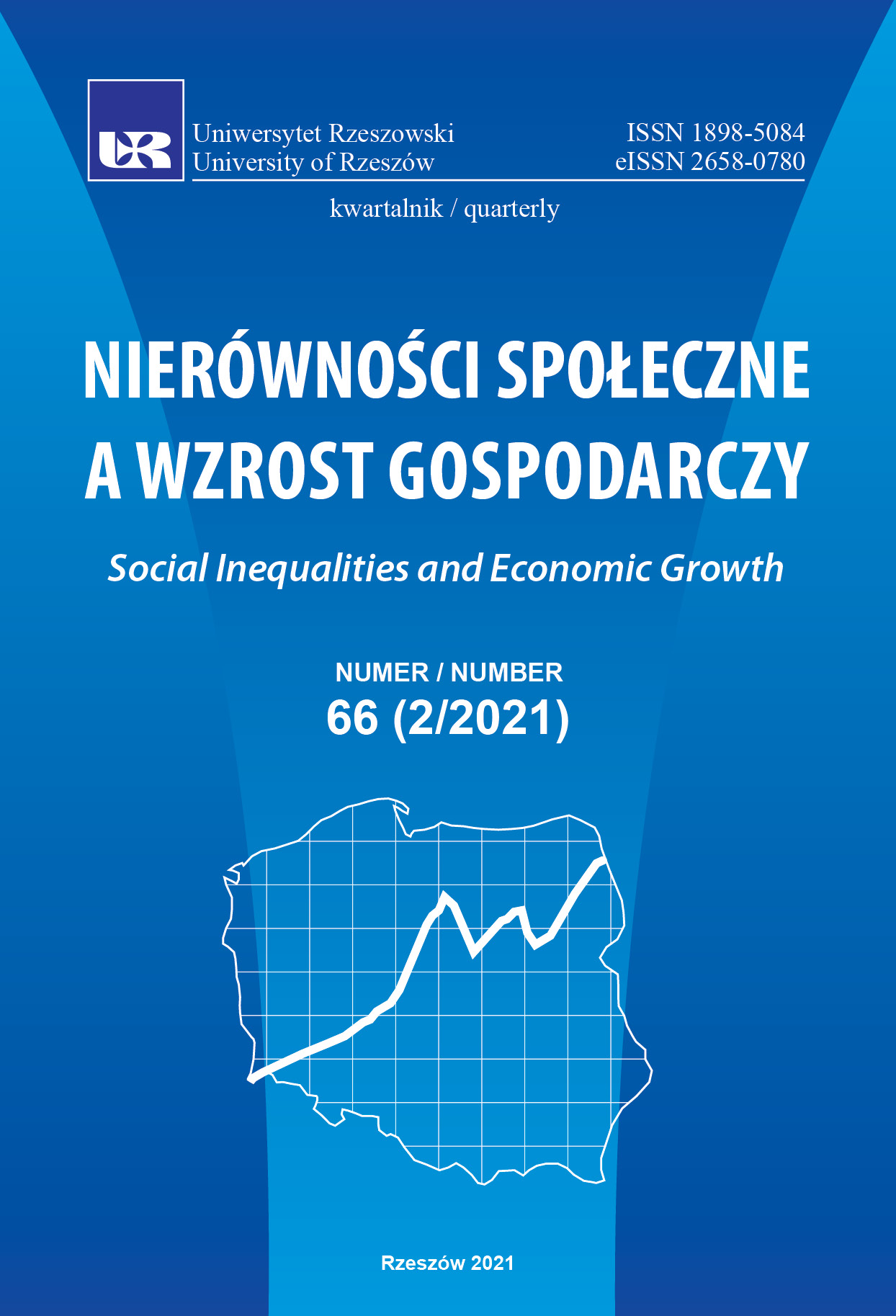The sociology of knowledge in the digital era – ‘digital labour’ and the ideology of social media
DOI:
https://doi.org/10.15584/nsawg.2021.2.5Keywords:
digital economy, social media, sociology of knowledge, Joseph Schumpeter, Karl MannheimAbstract
The article presents the evolution of social media through the prism of the sociological theories of Joseph Schumpeter and Karl Mannheim. The methodology of the sociology of knowledge, which was described in the first part of the work, was used for the analysis. According to Mannheim and Schumpeter, innovation plays a key role in the evolution of human consciousness. Consciousness influences the shape of social existence – relations of production and division of labour. Innovation appears in history as a mental product, but it is used to reform the economic relations prevailing in a given period. The article combines the analysis of ideological content related to social media with the concept of creative destruction presented by Schumpeter. From an ideological perspective, we have seen a transformation from utopia to ideology in the history of social media. According to Mannheim’s historical dialectic scheme, utopian slogans, such as the demand for democracy, gratuity and fun, could not be realized under market conditions. They have become ideological postulates disguising the actual activities of media corporations. The economic innovation of ‘audience labour’ prevent them from being implemented. The theory of ‘digital labour’, which was formulated by Christian Fuchs, is based on the concept of ‘audience labour’: prosumers create data which is then ‘sold’ to advertisers. It is unpaid and voluntary work that is ‘monetized’ by targeted advertising. This new system determines, on the one hand, the success of such giants as Facebook, whose business model is based on advertisements, and, on the other hand, the destruction of more traditional types of the advertising, especially advertising in newspapers and magazines.
Downloads
References
Afuah, A., Tucci, Ch. L. (2003). A model of the Internet as creative destroyer. IEEETransactions on Engineering Management, 50(4), 395–402. DOI: 10.1109/TEM.2003.819651.
Burawoy, M. (1985). The Politics of Production: Factory Regimes under Capitalism and Socialism. London: Verso.
Clement, J. (2020). Facebook: advertising revenue worldwide 2009–2019. Pobrane z: https://www.statista.com/statistics/271258/facebooks-advertising-revenue-worldwide/ (2021.05.16).
Czetwertyński, S. (2013). Twórcza destrukcja w gospodarce internetowej. Studia Ekonomiczne, 156, 269–278.
Durda, L., Ključnikov, A. (2019). Social networks in entrepreneurial startups development. Economics and Sociology, 12(3), 192–208. DOI:10.14254/2071-789X.2019/12-3/13.
Egidi, M. (2017). Schumpeter’s picture of economic and political institutions in the light of a cognitive approach to human behavior. Journal of Evolutionary Economics, 27(1), 139–159.
Evans, D. S. (2009). The online advertising industry: Economics, evolution, and privacy. Journal of Economic Perspectives, 23(3), 37–60. DOI: 10.1257/jep.23.3.37.
Fuchs, C. (2014). Digital Labour and Karl Marx. Nowy Jork: Routledge.
Fuchs, Ch. (2016). Critical theory of communication: New readings of Lukács, Adorno, Marcuse, Honneth and Habermas in the age of the internet. London: University of Westminster Press.
Fuchs, Ch. (2018a). Propaganda 2.0: Herman and Chomsky’s Propaganda Model in the Age of the Internet, Big Data and Social Media. W: J. Pedro-Carańana, D. Broudy, J. Klaehn (red.), The Propaganda Model Today: Filtering Perception and Awareness (s. 71–92). Londyn: University of Westminster Press. DOI: 10.16997/book27.
Fuchs, Ch. (2018b). The Online Advertising Tax as the Foundation of a Public Service Internet: A CAMRI Extended Policy Report. CAMRI Policy Briefs. London: University of Westminster Press. DOI: 10.16997/book23.
Fuchs, Ch., Sevignani, S. (2013). What is Digital Labour? What is Digital Work? What’s their Difference? And why do these Questions Matter for Understanding Social Media? tripleC, 11(2), 237–293.
Glapiński, A. (2004). Kapitalizm, demokracja i kryzys państwa podatków. Wokół teorii Josepha Aloisa Schumpetera. Warszawa: Oficyna Wydawnicza SGH.
Henton, D., Held, K. (2013). The dynamics of Silicon Valley: Creative destruction and the evolution of the innovation habitat. Social Science Information, 52(4), 539–557. DOI: 10.1177/0539018413497542.
International Communications Market Report 2015. Ofcom. Pobrane z: https://www.ofcom.org.uk (2021.05.7).
Kreft, J. (2015). Za fasadą społeczności: elementy zarządzania nowymi mediami. Kraków: Wydawnictwo UJ.
Mannheim, K. (2003a). The Problem of the Intelligentsia. An inquiry into its past and present role. W: K. Mannheim, Essays on the Sociology of Culture (s. 91–171). Nowy Jork: Routledge.
Mannheim, K. (2003b). Towards the sociology of the mind. An introduction. W: K. Man nheim, Essays on the Sociology of Culture (s. 15–91). Nowy Jork: Routledge.
Mannheim, K. (2008). Ideologia i utopia. Tłum. J. Miziński. Warszawa: Wydawnictwo Aletheia.
Maślak, E. (2002). J. A. Schumpeter pół wieku później – współczesna recepcja teorii. Ruch Prawniczy, Ekonomiczny i Socjologiczny, 64, 221–232.
Medearis, J. (2001). Ideology, Democracy and the Limits of Equilibrium: A Schumpeterian Critique. British Journal of Political Science, 31, 355–388.
Mika, B. (2014). Postkapitalizmy czy kapitalizm 2.0? Pracownicy wiedzy w kapitalizmie kognitywnym. Praktyka Teoretyczna, 11, 157–174. DOI: 10.14746/pt.2014.1.7.
Moura, M. G. (2017). Schumpeter and the meanings of rationality. Journal of Evolutionary Economics, 27(1), 115–138.
Negri, A. (2008). Goodbye Mr. Socialism. Tłum. K. Żaboklicki. Warszawa: Wydawnictwo W.A.B.
Nixon, B. (2015). W stronę ekonomii politycznej „pracy publiczności” w erze cyfrowej. Tłum. J. Krzeski. Praktyka Teoretyczna, 1(15), 124–158. DOI: 10.14746/prt.2015.1.4.
Papageorgiou, T., Michaelides, P. G. (2016). Joseph Schumpeter and Thorstein Veblen on technological determinism, individualism and institutions. The European Journal of the History of Economic Thought, 23, 1–30. DOI: 10.1080/09672567.2013.792378.
Schumpeter, J. (1960). Teoria rozwoju gospodarczego. Tłum. J. Grzywicka, Warszawa: Wydawnictwo Naukowe PWN.
Schumpeter, J. (2006). History of Economic Analysis. Nowy Jork: Routledge.
Schumpeter, J. (2009). Kapitalizm, socjalizm, demokracja. Warszawa: Wydawnictwo Naukowe PWN.
Smythe, D. W. (1977). Communications: blindspot of western Marxism. Canadian Journal of Political and Social Theory, 1(3), 1–27.
Turner, F. (2006). From counterculture to cyberculture: Stewart Brand, the Whole Earth Network and the rise of digital utopianism. Chicago: University of Chicago Press.
United Nations. (2019). Digital Economy Report. Value creation and capture: implications for developing countries. Pobrane z: https://unctad.org/system/files/official-document/der2019_en.pdf (2021.05.16).
Downloads
Published
How to Cite
Issue
Section
License

This work is licensed under a Creative Commons Attribution-ShareAlike 4.0 International License.


